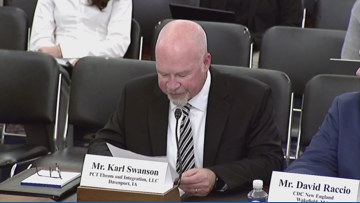Report on the Freedom Scholars Learning Center’s Social Action for Sustainable Development Goals
Event Overview and Alignment with SDG 4: Quality Education
The Freedom Scholars Learning Center conducted a public demonstration in Rochester, N.Y., as a component of the National Day of Social Action. The event, operating under the theme “Public Education is Public Good,” was strategically aligned with the principles of Sustainable Development Goal 4 (SDG 4), which aims to ensure inclusive and equitable quality education for all.
The demonstration’s core objectives focused on advancing SDG 4 by:
- Highlighting the critical impact of public policies that support and uplift students.
- Advocating for essential reforms and increased investments in public education at local, state, and national levels.
- Reinforcing the concept of education as a fundamental public good, essential for sustainable development.
Promoting Inclusive Institutions and Participatory Decision-Making (SDG 16 & SDG 4)
In a statement directly supporting SDG 16’s target for responsive, inclusive, and participatory decision-making, Freedom Scholars Executive Director Jeremy Smith emphasized the need to integrate student perspectives into policy formulation. The organization’s approach, as articulated, is founded on principles that advance both educational quality and just institutions.
- Centrality of Children’s Perspectives: The event underscored the principle that children are the primary stakeholders in education, and their voices are crucial for effective policy.
- Inclusion in Policy Dialogue: It addressed the systemic issue where student viewpoints are frequently excluded from decision-making tables, advocating for their inclusion to create more effective and equitable educational systems.
- Fostering Civic Responsibility: The demonstration served as a practical exercise in civic engagement, aligning with SDG 4.7’s goal of equipping learners with the knowledge and skills to promote sustainable development and global citizenship.
Student Advocacy for Educational Access and Reduced Inequalities (SDG 10)
The event prominently featured original works by students, including poetry, songs, and speeches. These contributions served as a powerful form of advocacy, directly addressing barriers to quality education and equity.
The themes of the student work correlate with specific SDG targets:
- Educational Access: Student expressions on this topic directly support the foundational mission of SDG 4 to ensure learning opportunities for all.
- Banned Books: This theme confronts issues of censorship and inequitable access to information, which undermines SDG 4 and contributes to the conditions targeted by SDG 10 (Reduced Inequalities).
- Self-Discovery: By exploring this theme, students highlighted the importance of a holistic and empowering educational experience, which is a key component of a quality education as defined by SDG 4.
1. Relevant Sustainable Development Goals (SDGs)
-
SDG 4: Quality Education
The article is centered on the theme “Public Education is Public Good.” It discusses the need for reforms, investments, and equitable access to education, which are the core principles of SDG 4. The event’s goal to “uplift students” and address “educational access” directly connects to the mission of ensuring inclusive and quality education for all.
2. Specific SDG Targets Identified
SDG 4: Quality Education
-
Target 4.1: By 2030, ensure that all girls and boys complete free, equitable and quality primary and secondary education leading to relevant and effective learning outcomes.
The article’s focus on “Public Education is Public Good” and “educational access” directly relates to this target. The demonstration advocates for policies and investments that support a universally accessible and high-quality public education system.
-
Target 4.7: By 2030, ensure that all learners acquire the knowledge and skills needed to promote sustainable development, including, among others, through education for sustainable development… global citizenship and appreciation of cultural diversity…
This target is addressed through the event’s emphasis on “civil responsibility.” Furthermore, the student-created work, including “poetry, songs, and speeches focused on the themes of self-discovery, banned books, and educational access,” demonstrates the practical application of education for global citizenship, human rights (access to information), and critical thinking.
3. Indicators for Measuring Progress
SDG 4: Quality Education
- Implied Indicator for Target 4.1: The article’s call for “necessary reforms and investments at all levels” implies a key metric for progress: the level of public expenditure on education. While not a formal UN indicator number, it is a clear measure suggested by the text to ensure education is a well-supported “public good.”
- Implied Indicator for Target 4.7: The article provides a qualitative indicator related to Indicator 4.7.1 (Extent to which global citizenship education and education for sustainable development are mainstreamed in curricula and student assessment). The mention of “original student work, including poetry, songs, and speeches” on themes like “civil responsibility” and “banned books” serves as tangible evidence that students are acquiring knowledge and skills related to global citizenship and human rights through their education.
4. Summary Table: SDGs, Targets, and Indicators
| SDGs | Targets | Indicators |
|---|---|---|
| SDG 4: Quality Education | 4.1: Ensure free, equitable, and quality primary and secondary education. | The call for “reforms and investments” implies tracking public expenditure on education to ensure it is treated as a “public good.” |
| SDG 4: Quality Education | 4.7: Ensure all learners acquire knowledge and skills for sustainable development, including global citizenship and human rights. | The creation of student work (poetry, songs, speeches) on “civil responsibility,” “banned books,” and “educational access” serves as a qualitative indicator of the implementation of global citizenship education (related to Indicator 4.7.1). |
Source: 13wham.com







